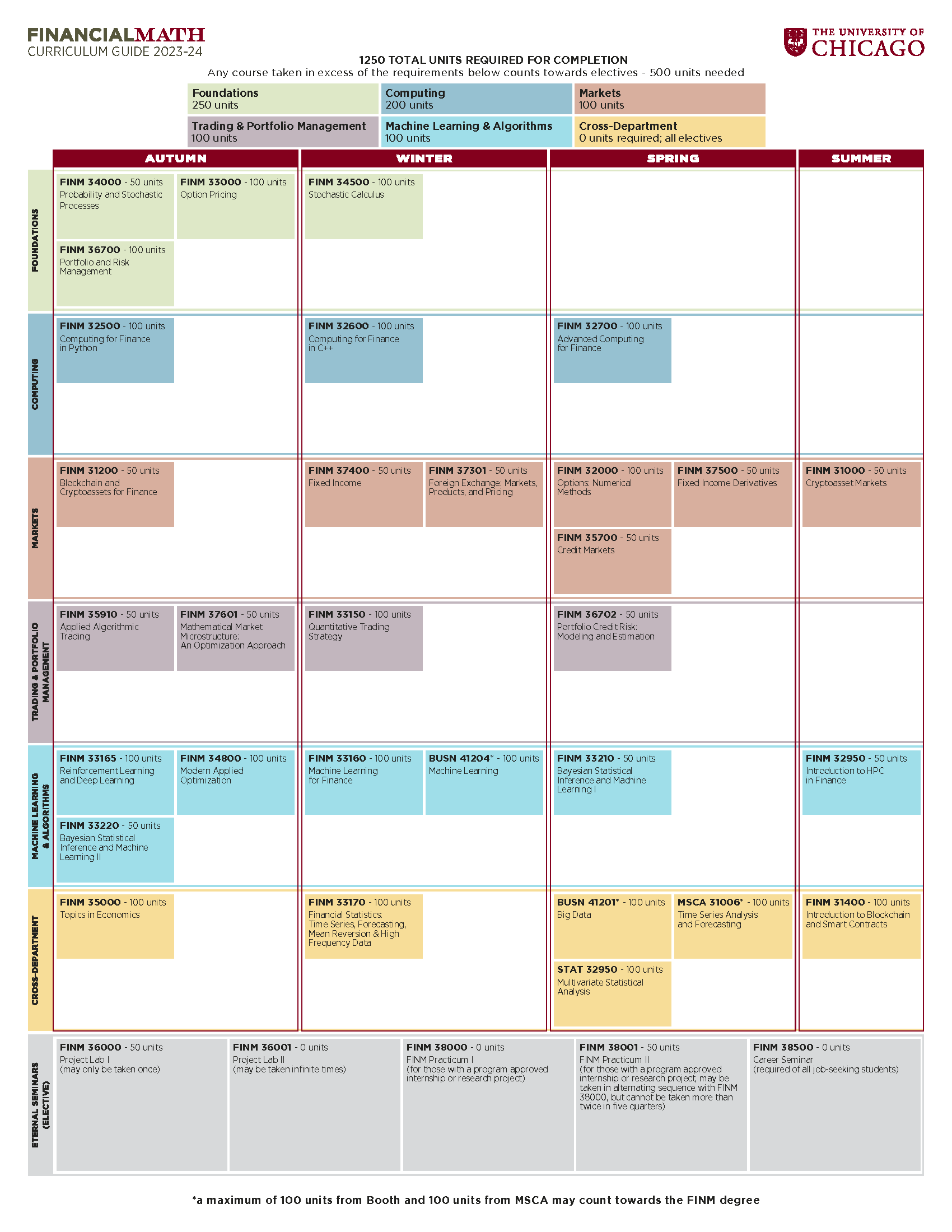Financial Mathematics | The University of Chicago
Key takeaways
- 4-qurter program (1 year)
- tuition fee about $90,000 in total
- strict mathematics prerequisites
Program
Deadline: January, March
Fee
Tuition fees are based on the number of units taken in any given quarter, with each 100-unit course set at a rate of $7,201 for the 2023-2024 academic year. Tuition is billed on a quarterly basis.
Prerequisites/requirements
Application fee: $90
Candidate profile
The Financial Mathematics Program seeks candidates with strong math skills, relevant work experience, and basic computer programming skills. We admit driven individuals that come from diverse educational, social, and geographic backgrounds. Candidates should be able to demonstrate excellence in both academics and leadership.
Required documents
- Resume/CV
- Transcripts
- 3 candidate statements (Each statement should be no longer than 250 words.)
- What has been your greatest shortcoming in preparing for the Financial Mathematics program and what steps have you taken to succeed in spite of this oversight?
- How does this program/university/city align with your career goals?
- Is there any additional information pertaining to your overall candidate profile that would be helpful to the committee to know?
- 2 Video Statements
- 3 Letters of Recommendation (At least one letter should be from a professional reference.)
Mathematics
All candidates should have a solid background in mathematics. The minimal math prerequisites are the successful completion of at least multivariable calculus, linear algebra, and probability.
Because our Program is accelerated, and because the coursework is dense and demanding, we cannot afford to be flexible about our math requirements.
Computer programming
In addition to academic mathematical training and work experience, candidates with basic computer programming skills, especially in C++ or other object-oriented languages, as well as experience in Python, will have an advantage in the Program. All students are required to take at least 250 units of Computing coursework within the FINM degree program.
Work experience
Candidates with industrial experience oftentimes find that they have an extra level of confidence in their decision to pursue a career in the financial industry. Although this is not as strict a requirement as the math skills, we do give this a fair amount of consideration.
English language test scores
Policy in the Physical Sciences Division requires a score of at least 90 on the TOEFL or 7 IELTS
TOEFL Institution Code: 1832
TOEFL Department Code: 72
Other test scores and materials
The GRE is not required of any applicant. Applicants are welcome to use a GRE score to enhance their application.
GRE Institution Code: 1832
GRE Department Code: 0799
(If the Department Code 0799 does not appear as an option, please search for, and select, “Mathematical Science - Other”)
Curriculum
In total, the Financial Mathematics degree requires the successful completion of 1250 units. A full-quarter course is 100 units, with courses that take place in the first-half or second-half of the quarter being 50 units.
Foundations
September Launch
FINM 34000 - Probability and Stochastic Processes (50 units)
Autumn Quarter
FINM 32500 - Computing for Finance in Python (100 units)
FINM 33000 - Option Pricing (100 units)
FINM 36700 - Portfolio and Risk Management (100 units)
Electives
900 Units Needed for Degree Completion
Winter Quarter
FINM 32600 - Computing for Finance in C++ (100 units)
FINM 32900 - Data Science Tools for Finance (100 units)
FINM 33150 - Quantitative Trading Strategy (100 units)
FINM 33160 - Machine Learning for Finance (100 units)
FINM 34500 - Stochastic Calculus (100 units)
FINM 37400 - Fixed Income (50 units)
FINM 37500 - Fixed Income Derivatives (50 units)
Spring Quarter
FINM 32000 - Options: Numerical Methods (100 units)
FINM 32700 - Advanced Computing for Finance (100 units)
FINM 33210 - Bayesian Statistical Inference and Machine Learning I (50 units)
FINM 35700 - Credit Markets (50 units)
FINM 35900 - Macro Finance (50 units)
FINM 36702 - Portfolio Credit Risk: Modeling and Estimation (50 units)
FINM 37301 - Foreign Exchange: Markets, Products, and Pricing (50 units)
Summer Quarter
FINM 31000 - Cryptoasset Markets (50 units)
FINM 32950 - Introduction to HPC in Finance (50 units)
Autumn Quarter
FINM 31200 - Blockchain and Cryptoassets for Finance (50 units)
FINM 33165 - Generative Models (100 units)
FINM 33220 - Bayesian Statistical Inference and Machine Learning II (50 units)
FINM 34800 - Modern Applied Optimization (100 units)
FINM 35000 - Topics in Economics (100 units)
FINM 35910 - Applied Algorithmic Trading (50 units)
FINM 37601 - Mathematical Market Microstructure: An Optimization Approach (50 units)
Degree concentrations
Financial Computing
250 units needed (450 available)
Financial Data Science
300 units needed (400 available)
Options and Derivatives
250 units needed (250 available)
Trading and Risk
300 units needed (550 available)
Project lab
The following is a small list of firms that our students have worked with:
- Abbot Downing - A Wells Fargo Business
- CME
- Ernst & Young
- Mizuho Bank
Students have worked on projects in the following areas:
- Algorithmic trading based on sentiment and news
- Risk management for illiquid and private securities
- Options volatility modeling
- Systematic macro strategies
- Data analytics

